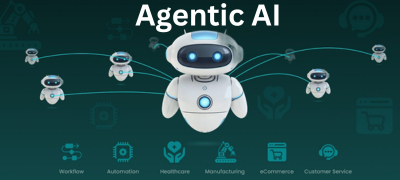💡 agentic AI
Agentic AI is the next evolution of Generative AI. Don't just prompt LLMs — orchestrate them into real, autonomous agents for research, development, decision-making & automation
AI


🧠 Foundations & Applications of Agentic AI
🎓 Duration: 6–8 Weeks
🧑🏫 Mode: Live Online | Hands-on + Projects
🎯 Target Audience:
• AI/ML Engineers & Developers
• Full Stack & Backend Developers
• Research Scholars & PhD Students
• Product Architects & Tech Leads
• Final-year Engineering Students (AI/DS/CS)
📘 Course Objectives
By the end of this course, learners will be able to:
✔️ Understand the core principles behind Agentic AI systems
✔️ Build autonomous LLM-powered workflows and agents
✔️ Apply planning, reasoning, memory & tool-use capabilities
✔️ Deploy real-world multi-agent systems using LangChain, AutoGen & CrewAI
✔️ Understand governance, safety & ethics in autonomous systems
📚 Course Modules & Topics
🔹 Module 1: Foundations of Agentic AI
• History of agentic systems & evolution from traditional AI
• Autonomy levels, agent taxonomy (AIA CPT)
• Reactive vs proactive agents
• Single-turn vs multi-turn reasoning
• Tool use vs tool mastery
🔹 Module 2: Core Components of Agentic Systems
• Perception & Knowledge: Multi-modal input, knowledge representation
• Reasoning & Planning: Sub-goal decomposition, task planning
• Action & Execution: Tool use, function calling, APIs
• Learning & Adaptation: RL & continual learning
• Interaction & Coordination: Multi-agent orchestration
• Governance & Safety: Audit trails, TRiSM (Trust, Risk, Security Management)
🔹 Module 3: Agentic Architectures & Protocols
• Agent-Oriented Programming: GOAL, SARL, PADE
• Distributed Agent Models: Actor Model (Akka)
• Communication Protocols: FIPA-ACL, KQML, NLIP
• Interoperability Standards: Model Context Protocol (MCP)
🔹 Module 4: Frameworks & Applied Agent Projects
🔸 LangChain
• Modular LLM Pipelines, Memory Buffers, Tool Integration
🧪 Project: Conversational Search Agent with Retrieval-Augmented LLM
🔸 LangGraph
• Graph-structured workflows, branching logic
🧪 Project: Translation & QA Pipeline using Directed Graph Agents
🔸 CrewAI
• Role-based team orchestration
🧪 Project: AI Research Report Generator (Researcher, Analyst, Writer)
🔸 MS AutoGen v0.4
• Scalable multi-agent frameworks
🧪 Project: IT Workflow Auto-Provisioning via multi-agent orchestration
🔸 Microsoft Semantic Kernel
• Enterprise-grade memory and function APIs
🧪 Project: Enterprise Chatbot with persistent memory and database querying
🔸 AutoAgent
• No-code agent generation
🧪 Project: Prompt-defined Agent Factory using AutoAgent’s interface
🔹 Module 5: Advanced Topics in Agentic AI
• Zero-code deployment (AutoAgent)
• Swarm generation (SwarmAgentic)
• Generalist agent frameworks (Magentic-One)
• TRiSM in multi-agent scaled deployment
🔹 Module 6: Ethics, Safety & Governance
• Governance mechanisms & auditability
• Human-in-the-loop safeguards
• Explainability & bias detection
• Compliance frameworks (GDPR, HIPAA for agents)
🎓 Capstone Project Options
• Build an enterprise agent system combining retrieval, planning, and tool use
• Develop a multi-agent orchestration workflow for a business process
• Prototype a no-code agent platform for non-technical users
🛠️ Tools & Frameworks
• LangChain, LangGraph, CrewAI, AutoGen, AutoAgent
• Python, FastAPI, Streamlit, React (for UI if needed)
• OpenAI API, Hugging Face Transformers
• Redis, PostgreSQL, Pinecone (for VectorDB demos)
📜 Deliverables
• Agent use case demos with code
• Final Capstone project (solo or team-based)
• Certificate of Completion
• Assessment & Interview Readiness for Agentic AI Roles
💼 Career Outcomes
• Agentic AI Engineer
• LLM Workflow Designer
• Autonomous System Architect
• Prompt Engineer / Agent Developer
• Research Assistant – Multi-agent Systems
